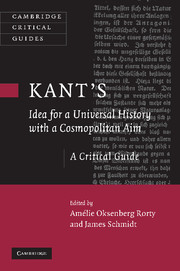Book contents
- Frontmatter
- Contents
- List of contributors
- List of abbreviations
- Introduction: history as philosophy
- Idea for a Universal History with a Cosmopolitan Aim
- 1 Teleology and history in Kant: the critical foundations of Kant's philosophy of history
- 2 The purposive development of human capacities
- 3 Reason as a species characteristic
- 4 Good out of evil: Kant and the idea of unsocial sociability
- 5 Kant's Fourth Proposition: the unsociable sociability of human nature
- 6 The crooked timber of mankind
- 7 A habitat for humanity
- 8 Kant's changing cosmopolitanism
- 9 The hidden plan of nature
- 10 Providence as progress: Kant's variations on a tale of origins
- 11 Norms, facts, and the philosophy of history
- 12 Philosophy helps history
- Bibliography
- Index of names and works
9 - The hidden plan of nature
Published online by Cambridge University Press: 28 July 2009
- Frontmatter
- Contents
- List of contributors
- List of abbreviations
- Introduction: history as philosophy
- Idea for a Universal History with a Cosmopolitan Aim
- 1 Teleology and history in Kant: the critical foundations of Kant's philosophy of history
- 2 The purposive development of human capacities
- 3 Reason as a species characteristic
- 4 Good out of evil: Kant and the idea of unsocial sociability
- 5 Kant's Fourth Proposition: the unsociable sociability of human nature
- 6 The crooked timber of mankind
- 7 A habitat for humanity
- 8 Kant's changing cosmopolitanism
- 9 The hidden plan of nature
- 10 Providence as progress: Kant's variations on a tale of origins
- 11 Norms, facts, and the philosophy of history
- 12 Philosophy helps history
- Bibliography
- Index of names and works
Summary
Kant's discussion of the Eighth Proposition of the Idea for a Universal History with a Cosmopolitan Aim marks an all-important turning point of his entire argument. Let us first take note of the proposition itself.
Eighth Proposition: One can regard the history of the human species in the large as the completion of a hidden plan of nature to bring about an inwardly and, to this end, also an externally perfect state constitution, as the only condition in which it can fully develop (entwickeln) all its predispositions (Anlagen) in humanity.
This Proposition, Kant states, is a consequence of the previous one. Indeed, lawful external relations between states such as to make wars between them unnecessary are a prerequisite for a stable civil society in which reason can flourish. For reason, Kant had stated in the Second Proposition, can develop fully only in the species, but not in the individual. Its development requires favorable conditions in society, which can only be fulfilled if a certain amount of international stability prevails.
As a human capacity reason is still a product of nature. It is what distinguishes us from all the other natural creatures. Most animals are endowed by nature with species-specific instincts (or organs) that guide their struggle for survival. Humans, by contrast, were initially endowed by nature only with those instincts that belong to animals in general – sexual instincts, instinct for food, etc. – but with none that were specific to their species.
- Type
- Chapter
- Information
- Kant's Idea for a Universal History with a Cosmopolitan Aim , pp. 187 - 199Publisher: Cambridge University PressPrint publication year: 2009
- 3
- Cited by



